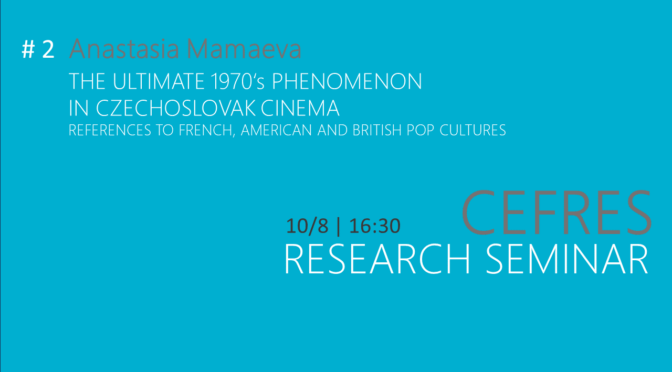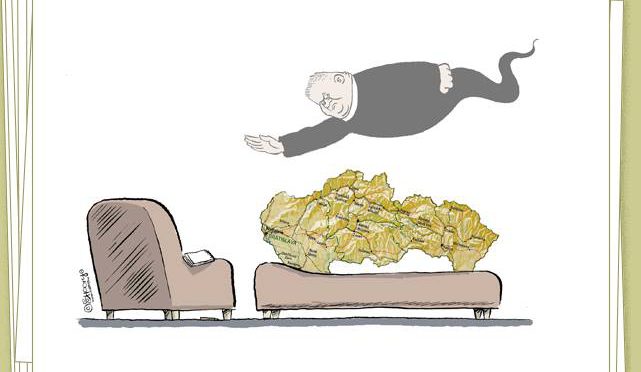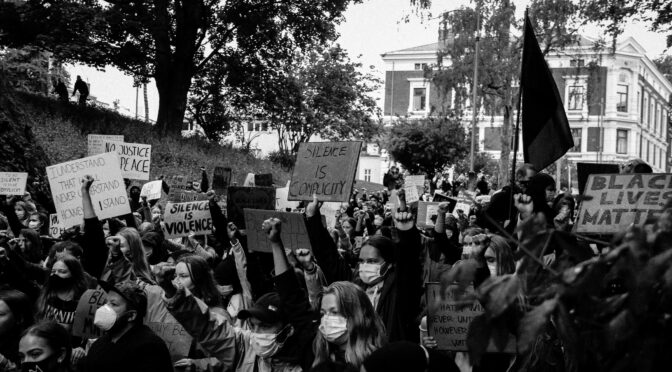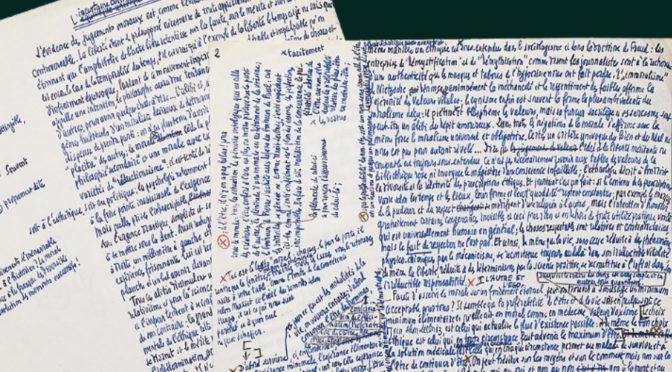The two faces of contemporary nationalism
Lecture by Alain Dieckhoff, Director of CERI (Center for International Studies, Sciences Po, Paris)
Where: Pražské kreativní centrum (Staroměstské náměstí 4/1, 110 00 Prague 1, Studio)
When: 12 April 2019, 10 am – 12 pm
Organizers: CEFRES, Faculty of Social Sciences (Charles University), French Institute in Prague
Language: English
Abstract
The idea of the “end of nationalism” has been shared by many after the end of the Cold War. However, it proved to be deeply wrong. Nationalism remains a strong historical either as separatism or as national-populism. And globalization is not, by essence, anti-nationalist, as proven by long-distance nationalism.
Moderated by Eliška Tomalová and Jérôme Heurtaux

References to French, American and British Pop Cultures as the Ultimate 1970s Phenomenon in Czechoslovak Cinema
2nd session of CEFRES in-house seminar
Through the presentation of works in progress, CEFRES’s Seminar aims at raising and discussing issues about methods, approaches or concepts, in a multidisciplinary spirit, allowing everyone to confront her or his own perspectives with the research presented.
Location: CEFRES Library & Online
Date: Tuesday, 8 Octobre, 2024 at 4:30 p.m.
Language: English
Contact / To register: cefres[@]cefres.cz
Chair: Františka Schormová (Institute of Czech Literature, Czech Academy of Sciences)
Abstract Continue reading The Ultimate 1970’s Phenomenon in Czechoslovak Cinema →

A lecture by Monika Vrzgulová (Institute of Ethnology SAS) in the frame of the seminar on Modern Jewish History of the Institute of Contemporary History (AV ČR) and CEFRES in partnership with the Jewish Museum
Language: Slovak

A session led by Lara Bonneau
It is possible to conceive transdisciplinarity as sharing of objects or methods by several disciplines. Besides objects and methods, it can also be – and this might be its first form – the sharing of a common lexicon. The tendency of certain human sciences – philosophy in particular – to use concepts elaborated by other disciplines in other contexts was sharply criticized by Alan Sokal in 1994, in what remains known as the Sokal Affair. The physicist tried to discredit the way certain philosophers were using concepts that belonged to the natural sciences, showing their ignorance about the real meaning of these concepts in their original field and thereby reducing their work to vain language games. Indeed, the use of analogy and metaphor in the human sciences can be put into question. During this session, I will try to show that, if it is not without danger, the use of analogy and metaphor is inherent to the scientific activity, which can moreover be both legitimate and fruitful. I will start with a concrete example: the way the art historian Aby Warburg uses analogy and metaphors from the natural sciences. I will then rely on a more reflexive text about the legitimacy of this method entitled Théorie de l’acte analogique in Simondon’s L’individuation à la lumière des notions de forme et d’information.
Readings:
- Gilbert Simondon. L’individu et sa genèse physico-biologique. Paris: PUF, 1964, pp. 264-268.
- Alan Sokal. ‘A Physicist Experiments with Cultural Studies.’ Lingua Franca May/June 1996, available at: http://linguafranca.mirror.theinfo.org/9605/sokal.html
- Aby Warburg. Miroirs de faille, A Rome avec Giordano Bruno et Edouard Manet. Paris: Presses du réel/L’écarquillé, 2011, pp. 62, 64.

The “Voice from Below” – In the Face of Repression and Arbitrary State Violence
Third Doctoral Workshop organized within a cooperation Agreement between the Ecole des Hautes Etudes en Sciences sociales (EHESS), CEFRES, Charles University and the Czech Academy of Sciences
Date: 22 November 2024
Location: CEFRES, Na Florenci 3, Prague 1 (and online, to connect, please write to cefres@cefres.cz)
Language: English
Read the thesis of the Workshop here.
Program
Continue reading The Voice from Below | PhD Workshop CEFRES-EHESS →

International Conference
Organizers: Benedetta Zaccarello (CNRS-CEFRES) and Thomas C. Mercier (CEFRES / FHS UK)
When & Where: 7-9 June 2018 at the French Institute of Prague, 5th Floor, Štěpánská 35, 110 00 Prague 1
Partners: FHS UK, The Jan Patočka Archive, FLÚ AV ČR, ITEM (CNRS-ENS), Bibliothèque Nationale de France, The Wittgenstein Archives at Bergen University, with the support of the French Institute in Prague and the program PARCECO of the MENESR
The conference will comprise four sections:
- Archive (Hi)stories: Thinking Theory through Authors’ Manuscripts.
- Archives in the digital age.
- What archives do to philosophy: methodologies in editing and interpreting.
- The Political Implications of Archives and their Conservation.
The afternoon session of the first day (7th June) will be dedicated to Jan Patočka and his archives.
See the program below
Abstract
The international conference “The Wording of Thoughts: Philosophy from the Standpoint of its Manuscripts and Archives” aims to establish a dialogue between experts of different archival corpuses coming from various countries and continents, so as to sketch methodological lines and to build a pioneer network focused on philosophical archives. Philosophy is written, practiced, lived through: it is the translation of the experience of a thinking subjectivity in a conceptual alphabet and a verbal fabric. The “making of a philosophical text”, including its cultural features and societal contingencies, challenges the representation of the discipline’s history as a series of abstract findings and innovative intuitions that constitute the landmarks of our paradigms. The philosopher who writes is the first inclined to erase the complex intricacies of the negotiations between existence and theory, between conceptual inventiveness and shared vocabulary inherited from a centuries-old tradition. Yet it is obvious that the dynamics of philosophy production and reception are a complex phenomenon whose writing nature is a crucial stake.
For all these reasons, the philosophical manuscript is an odd object that has only recently started to receive proper appraisal. In Europe, nevertheless, the creation of archive centres gathering major philosophical data has sustained the memory of philosophical writing and enabled such “arches” to cross time. It is beyond doubt that accessing these archives often enables to better understand the appearance, the method, the approach and even the sources, along with the polemical targets and the hints that published books tend to excise or dim. Moreover, in exploring the history of several philosophical archives and their rooting in specific social and cultural contexts, we aim to appreciate the role of such archival materials and their importance so as to develop new approaches to philosophical studies, including the history of philosophy and the exegesis of theoretical thought.
Continue reading The Wording of Thoughts. Philosophy from the Standpoint of its Manuscripts and Archives →





